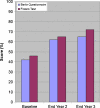Extended evaluation of a longitudinal medical school evidence-based medicine curriculum
- PMID: 21286836
- PMCID: PMC3101983
- DOI: 10.1007/s11606-011-1642-8
Extended evaluation of a longitudinal medical school evidence-based medicine curriculum
Abstract
Background: Evidence-based medicine (EBM) is an important element of medical education. However, limited information is available on effective curricula.
Objective: To evaluate a longitudinal medical school EBM curriculum using validated instruments.
Design, participants, measurements: We evaluated EBM attitudes and knowledge of medical students as they progressed through an EBM curriculum. The first component of the curriculum was an EBM "short course" with didactic and small-group sessions occurring at the end of the second year. The second component integrated EBM assignments with third-year clinical rotations. The 15-point Berlin Questionnaire was administered before the course in 2006 and 2007, after the short course, and at the end of the third year. The 212-point Fresno Test was administered before the course in 2007 and 2008, after the short course, and at the end of the third year. Self-reported knowledge and attitudes were also assessed in all three classes of medical students.
Results: EBM knowledge scores on the 15-point Berlin Questionnaire increased from baseline by 3.0 points (20.0%) at the end of the second year portion of the course (p < 001) and by 3.4 points (22.7%) at the end of the third year (p < 001). EBM knowledge scores on the 212-point Fresno Test increased from baseline by 39.7 points (18.7%) at the end of the second year portion of the course (p < 001) and by 54.6 points (25.8%) at the end of the third year (p < 001). On a 5-point scale, self-rated EBM knowledge increased from baseline by 1.0 and 1.4 points, respectively (both p < 001). EBM was felt to be of high importance for medical education and clinical practice at all time points, with increases noted after both components of the curriculum.
Conclusions: A longitudinal medical school EBM was associated with markedly increased EBM knowledge on two validated instruments. Both components of the curriculum were associated with gains in knowledge. The curriculum was also associated with increased perceptions of the importance of EBM for medical education and clinical practice.
Figures


References
-
- Liaison Committee on Medical Education. Functions and structure of a medical school: standards for accreditation of medical education programs leading to the M.D. degree. Available at: http://www.lcme.org/functions2010jun.pdf. Accessed June 14, 2010
-
- Accreditation Council for Graduate Medical Education. Common program requirements: general competencies. Available at: http://www.acgme.org/outcome/comp/GeneralCompetenciesStandards21307.pdf. Accessed August 18. 2010.
Publication types
MeSH terms
LinkOut - more resources
Full Text Sources

